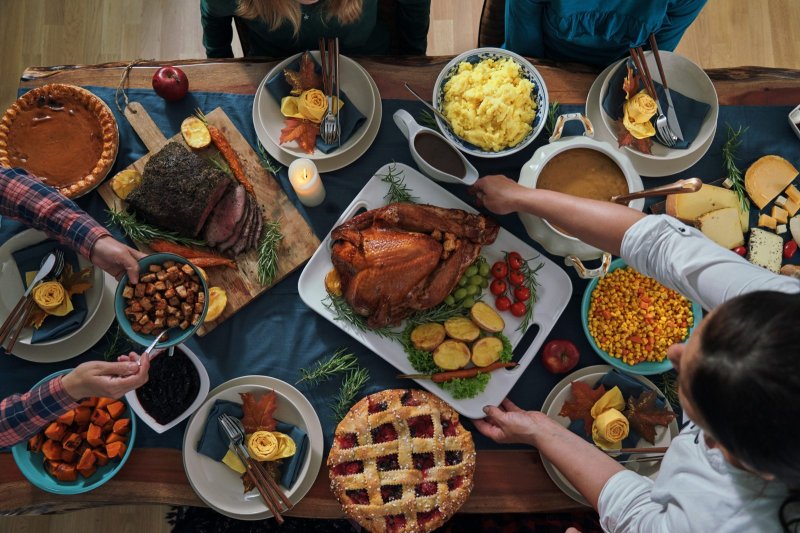
Ways To Reduce Food Waste At Thanksgiving
Thanksgiving is often celebrated with a feast that is expansive in gratitude and in the food served as seen in the photo above from TIME magazine. Turkey leftovers are often as valuable as the meal itself!
In November, 2022, TIME magazine's Emily Barone described the humanitarian and environmental value of reducing food waste all year long.
There’s no better way to give thanks for our food by making sure none of it goes to waste irresponsibly. By wasting less as you plan, prepare, and enjoy the holiday, you’ll reduce the 40% of food that gets wasted in our country. It’s also a great way to build new habits and get your family and friends involved in the issue.
Some advance planning tips from the authors of "Purple Kale Kitchenworks", "Food Waste Feast" and "Perfectly Good Food"” can keep food from being put in the garbage, create great left-overs and help ease the food waste toll on the environment!
1. Get help in estimating how much food you will need to keep your guests full and happy, using the Guestimator from Save the Food.com. They provide recipes, too!
2. Choose recipes that “fit” together. Carefully examine ingredient lists so you can choose recipes that will use up whole vegetables, containers of broth, etc. So, if stuffing calls for one and a half onions, look for a gravy recipe that will use up that other half an onion. Suggested by Ronna Welsh, of Purple Kale Kitchenworks.
3. Plan ahead for “special” ingredients. If a holiday recipe calls for unique or expensive, ingredients, (like buttermilk, cream, or fresh herbs), the items might not be used up in one dish or fit with any other dish in the meal. Plan ahead for these ingredients by finding out how to store them for the longest period of time (freezing, canning, drying) or coming up with recipes in which they can be used.
4. Transform extras into (almost-)ready meals. Take a moment while you’re cooking or packing up leftovers to prep and stash unused items for use later on. For example: Sauté an onion to use later. Create an almost-finished soup to freeze. Have extra broth on hand, since many foods freeze better in liquid. Put some veggies, shredded cooked turkey and extra fresh herbs in with some stock and freeze in a container or resealable plastic bag. Later, reheat, adjust seasonings and simmer until the flavors are blended; top with cheese, croutons or other leftovers for a quick and easy meal.
5. Don’t trash scraps. Consider mashing potatoes with the skins on, or toss the peelings with a little olive oil, salt and pepper and bake at 375ºF for 15-20 minutes until crisp. Use the “chips” as a snack or to garnish other dishes. Peelings and trimmings can be reserved for other uses. Homemade stock is an easy way to use vegetable peels and poultry or meat bones. Stock can be frozen for months to enjoy later.
6. Promote smaller portions. Guests may be inclined to load up their plates with far more than they’ll actually eat in one sitting. Some hosts set out smaller serving spoons, if the meal will be family-style.
7. Get clever with leftovers. There are ways other than simply reheating leftovers to transform holiday dishes into new ones. Bake stuffing on a rimmed baking sheet at 375ºF until it’s dry and crisp, then use the new croutons within a week (or freeze for another day). Use stuffing as a base for an egg strata. Add other leftovers to a good egg frittata. Blend extra mashed potatoes with broth to make creamy potato soup and add garlic or other herbs. Mix or mash together any complementary foods (turkey and mashed potatoes; green beans and stuffing) and use to fill savory hand pies with store-bought pie-crust dough. Wrap “pies” well and freeze. Later, bake in a 350ºF oven until golden brown.
8. Be generous! Offer to transfer leftovers from a guest’s plate and/or extras of other dishes that are left for guests who’d like them to be packaged up and taken home.
9. Still have leftover food? If you fry your turkey, check into cooking oil recycling in your area. The City of La Crosse, for instance, collects cooking oil at Isle La Plume waste collection site. In the winter months, call the Recycling Department (608-789-7508) to schedule a drop off. Uncooked veggies and vegetable scraps can be composted. Search your city cite for compost options near you or try findacomposter.com.
If you’re interested in doing more to reduce food waste at home, take a free, 4-week "I Value Food" Challenge" provided bt "Sustainable America". You will learn easy ways to waste less food, save money and challenge your friends, if you choose! They also offer a Toolkit to help with meal planning, shopping, recipes, use of leftovers, food storage, expiration dates and more!
To learn more about food waste and its impact on the planet, visit the USDA Food Waste Facts page.
Story:
Appreciating food and its origins is an aspect of gratitude that can deepen our spirituality at dinner and in every aspect in which food touches our lives. It is common to offer thanks for the plants, creatures and hands that bring food from farm and forest to table. Beyond a meaningful mealtime grace, we can make a conscious effort to acknowledge with warmth and courtesy all who serve in food supply jobs from check-out clerks to those who legislate state and federal food policy. It is a sacred activity to feed the hungry, especially where good food is scarce.
Curiosity about food cultures and where foods originate or exploring a favorite food or cuisine can add to our appreciation of food. Giving back, sharing meals, wasting less express our appreciation for the gift of food.





